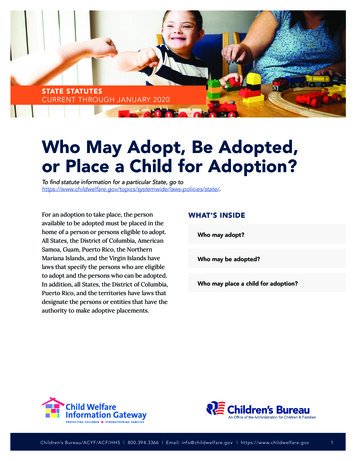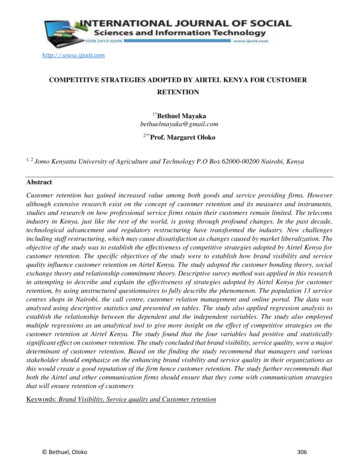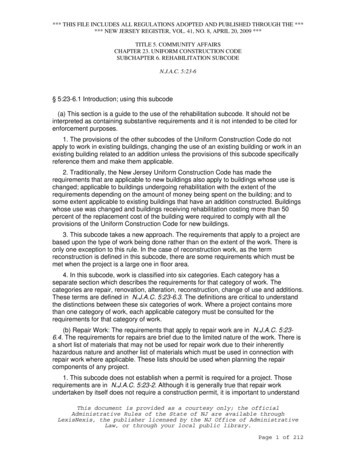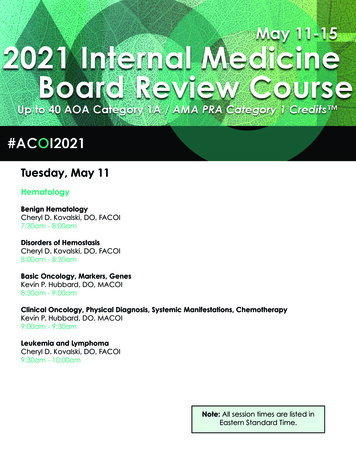
Transcription
STATE STATUTESCURRENT THROUGH JANUARY 2020Who May Adopt, Be Adopted,or Place a Child for Adoption?To find statute information for a particular State, go aws-policies/state/.For an adoption to take place, the personavailable to be adopted must be placed in thehome of a person or persons eligible to adopt.All States, the District of Columbia, AmericanSamoa, Guam, Puerto Rico, the NorthernMariana Islands, and the Virgin Islands havelaws that specify the persons who are eligibleto adopt and the persons who can be adopted.In addition, all States, the District of Columbia,Puerto Rico, and the territories have laws thatdesignate the persons or entities that have theauthority to make adoptive placements.WHAT'S INSIDEWho may adopt?Who may be adopted?Who may place a child for HSBureau/ACYF/ACF/HHS 800.394.3366 800.394.3366 Email: Email:info@childwelfare.govinfo@childwelfare.gov https://www.childwelfare.gov https://www.childwelfare.gov1
WHO MAY ADOPT?In general, any single adult or a marriedcouple jointly can be eligible to adopt.1 Inaddition, a stepparent can adopt the childof his or her spouse if the spouse has legalcustody of the child.2 In Vermont, a personmay adopt the child of his or her partner.In approximately 11 States, American Samoa,and the District of Columbia, there are noadditional conditions specified.3 In someStates, married persons may adopt singly ifthey are legally separated or if their spouse islegally incompetent.ELIGIBILITY BY AGEIn approximately seven States and PuertoRico, prospective parents must be at leastage 18 to be eligible to adopt.4 Three States(Colorado, Delaware, and Oklahoma) andAmerican Samoa set the age at 21; and Georgiaand Idaho specify age 25. A few States allowminors to adopt under certain circumstances,such as when the minor is the spouse of anadult adoptive parent.In approximately six States and the NorthernMariana Islands, the adopting parents must beat least 10 years older than the person to beadopted.5 In Puerto Rico, the adopting parentmust be at least 14 years older; in Idaho, theparent must be at least 15 years older.ELIGIBILITY BY RESIDENCYApproximately 17 States, Guam, the NorthernMariana Islands, Puerto Rico, and the VirginIslands require that petitioners for adoptionbe State residents.6 The required period ofresidency ranges from 60 days to 1 year. Thereare exceptions to the residency requirementin some of these States. For example, inseven States, a nonresident may adopt a childwho has been placed in his or her home bya public child welfare agency in the child'soriginal State of residency.7 In Minnesota,South Carolina, and Tennessee, a child may beadopted by a nonresident who is the child'srelative. Indiana and South Carolina allowa nonresident to adopt a child with specialneeds. In Illinois, Mississippi, New Mexico,and Rhode Island, a nonresident may adoptthrough an agency.Twenty States (Alabama, Alaska, Arizona, Arkansas, Florida, Hawaii, Indiana, Iowa, Kentucky, Massachusetts, Montana,Nebraska, New Hampshire, North Dakota, Ohio, Oklahoma, Rhode Island, Virginia, West Virginia, and Wisconsin), Guam,and the Northern Mariana Islands specifically require that a "husband and wife" petition jointly. The other States use moregender-neutral language in their statutes. In Arizona a married couple must be given preference for placement of a child overa single person when all other considerations are determined equal.2A parent can usually adopt a stepchild without the spouse (the birth parent with legal custody of the child) joining in thepetition, as long as the spouse consents to the adoption.3The word "approximately" is used to stress the fact that the statutes are constantly being revised and updated. Thisinformation is current as of January 2020. In North Carolina, Pennsylvania, and Texas, any adult may adopt. In Colorado,Connecticut, Louisiana, Maryland, Missouri, Vermont, and Washington, a single adult and married couples jointly may adopt.In Vermont, any adult and a prospective adoptive parent's partner may adopt.4Connecticut, Kentucky, Louisiana, Montana, New Jersey, Tennessee, and Washington5California, Georgia, Nevada, New Jersey, South Dakota, and Utah6Arizona, Delaware, Georgia, Idaho, Illinois, Indiana, Kentucky, Minnesota, Mississippi, New Mexico, Oregon, Rhode Island,South Carolina, Tennessee, Virginia, Wisconsin, and Wyoming have residency requirements. Some States make exceptionsto the residency requirements for members of the military. For example, in Illinois, a member of the military can be eligibleto adopt after he or she has been domiciled in the State for 90 days. South Carolina waives the residency requirement if oneadopting parent is a member of the military stationed in the State. Tennessee will allow a nonresident to adopt in a Tennesseecourt if the adopting parent was a Tennessee resident prior to entering the military. For more information on adoption bymilitary families, see Information Gateway's Military Families Considering Adoption.7Arizona, Delaware, Georgia, Kentucky, New Mexico, South Carolina, and Virginia1Children’s Bureau/ACYF/ACF/HHS 800.394.3366 Email: info@childwelfare.gov https://www.childwelfare.gov2
ADOPTION BY SAME-SEX COUPLESThe statutory laws in most States arelargely silent on the issue of adoption bygay and lesbian persons as single persons.For same-sex couples who wish to adopt achild together, the situation is less clear asmany States require that a husband and wifepetition jointly. Whether the language canapply to same-sex couples who are legallymarried is undetermined. In approximately23 States, the District of Columbia, and theVirgin Islands, the use of gender-neutrallanguage, including "spouses" or "marriedcouples," serves to allow adoption by samesex couples.8 Only Mississippi specificallyprohibits adoption by couples of the samegender.WHO MAY BE ADOPTED?All States, the District of Columbia, AmericanSamoa, Guam, the Northern Mariana Islands,Puerto Rico, and the Virgin Islands permit theadoption of a child. Some States also allow theadoption of an adult, under the circumstancesdescribed below.ADOPTION OF A CHILDThree States (Colorado, Indiana, and RhodeIsland), American Samoa, and the NorthernMariana Islands specify that the child to beadopted must be under age 18. Six States(Colorado, Connecticut, Delaware, Montana,Texas, and Wisconsin), American Samoa, andGuam specify in statute that the child must belegally free for adoption.9 Six States (Arizona,Colorado, South Carolina, Texas, Wisconsin,and Wyoming), American Samoa, and theVirgin Islands require that the child to beadopted must be present in the State at thetime the petition is filed. Iowa and Nebraskarequire that the child must have resided fora minimum of 180 days in the home of theprospective adoptive parents.ADOPTION OF AN ADULTApproximately 29 States and the District ofColumbia allow the adoption of any person,regardless of age.10 Colorado, Rhode Island,American Samoa, and the Northern MarianaIslands allow parties to petition the court forthe adoption of persons over age 18 but underage 21. Massachusetts and Nevada specifythat the adult to be adopted must be youngerthan the adoptive parent. West Virginia andWisconsin require that the adopting parent bea resident of that State to adopt an adult.Alabama permits adoption of adults only ifthe person to be adopted has a permanentand total physical or intellectual disability.Ohio allows adoption of an adult only whenthe person to be adopted has a total orpermanent physical or intellectual disabilityor is a stepchild or foster child with whom therelationship was established while the personwas a minor.California (by spouse or domestic partner), Colorado, Connecticut, Delaware, Georgia, Idaho, Illinois (spouses and civilunion partners), Kansas, Louisiana, Maine, Maryland, Michigan, Minnesota, Missouri, Nevada, New Jersey, New Mexico, NewYork (spouses and unmarried intimate partners), North Carolina, South Dakota, Tennessee, Utah, and Vermont use genderneutral language in their statutes. In Utah, the State social services division is required to place a child in its custody with aman and woman married to each other, unless that placement is contrary to the child's best interests.9A child is legally free for adoption when both birth or current legal parents have had their parental rights terminated orhave consented the child's adoption.10Alaska, Arkansas, Florida, Georgia, Hawaii, Indiana, Iowa, Kansas, Maine, Maryland, Massachusetts, Michigan, Minnesota,Mississippi, Montana, Nebraska, Nevada, New Hampshire, New York, North Carolina, North Dakota, Oklahoma, Oregon,Pennsylvania, Tennessee, Utah, Texas, Vermont, and Washington8Children’s Bureau/ACYF/ACF/HHS 800.394.3366 Email: info@childwelfare.gov https://www.childwelfare.gov3
Idaho, Illinois, and South Dakota requirethat the adopting parent be in a sustainedparental relationship for a specified time,ranging from 6 months to 2 years, with theadult to be adopted. Connecticut allows astepparent to adopt the adult child of his orher spouse. Virginia allows the adoption of anadult stepchild, niece, or nephew, as long asthe adopted person resided in the home forat least 3 months prior to reaching adulthoodand is at least 15 years younger than theadopting parent.WHO MAY PLACE A CHILD FORADOPTION?In general, any person or entity who has theright to make decisions about a child's careand custody may place that child for adoption.Such persons include the birth parents or thechild's legal guardian or guardian ad litem;legal entities include State departmentsof social services or licensed child-placingagencies. All States, the District of Columbia,American Samoa, Guam, the NorthernMariana Islands, Puerto Rico, and the VirginIslands specifically designate the personsor entities that hold the authority to makeadoptive placements.AGENCY AND DEPARTMENT PLACEMENTSApproximately five States require that alladoptive placements be made by the States'departments of human or social services orchild-placing agencies that are licensed bythe State or meet certain standards.11 In fourStates and Guam, placement must be throughan agency unless the child is being adopted byhis or her stepparent or a relative.12NONAGENCY PLACEMENTSMost States allow nonagency placementsof children for adoption, which are oftenreferred to as private or independentadoptions. One type of private adoptionallowed in most States is the direct placementof a child by the birth parent with anadoptive family. Many States that allow directplacement have detailed statutory regulationsto protect the interests of the parties to theadoption. For example, in nine States, parentswho wish to make private placements mustnotify the department or obtain the approvalof the department or the court.13 In Delaware,a parental placement for adoption of a childwith a nonrelative must be supervised bythe department or a child-placing agency.An exception to these requirements may bemade when the child is to be placed with astepparent or birth relative.A few States allow the use of intermediariesin arranging private placements. Theseintermediaries are usually attorneys, and theiractivities, as well as the compensation theyare allowed to accept, are strictly regulated.14This publication is a product of the StateStatutes Series prepared by Child WelfareInformation Gateway. While every attempthas been made to be complete, additionalinformation on these topics may be inother sections of a State's code as well asagency regulations, case law, and informalpractices and procedures.Colorado, Delaware, Indiana, Ohio, and West VirginiaKentucky, Louisiana, Missouri, and Rhode Island13Florida, Kentucky, Maryland, Massachusetts, Minnesota, Missouri, New Mexico, Rhode Island, and Wisconsin14For additional information about the use of intermediaries, see Child Welfare Information Gateway's Use of Advertising andFacilitators in Adoptive Placements.1112Children’s Bureau/ACYF/ACF/HHS 800.394.3366 Email: info@childwelfare.gov https://www.childwelfare.gov4
SUGGESTED CITATION:Child Welfare Information Gateway. (2020).Who may adopt, be adopted, or place a child foradoption. Washington, DC: U.S. Department ofHealth and Human Services, Administrationfor Children and Families, Children's Bureau.U.S. Department of Health and Human ServicesAdministration for Children and FamiliesAdministration on Children, Youth and FamiliesChildren’s BureauThis material may be freely reproduced and distributed. However, when doing so, please credit Child Welfare Information Gateway.This publication is available online at s-policies/statutes/parties/.Children’s Bureau/ACYF/ACF/HHS 800.394.3366 Email: info@childwelfare.gov https://www.childwelfare.gov5
Island), American Samoa, and the Northern Mariana Islands specify that the child to be adopted must be under age 18. Six States (Colorado, Connecticut, Delaware, Montana, Texas, and Wisconsin), American Samoa, and . 8 . California (by spouse or domestic partner), Colorado, Connectic











